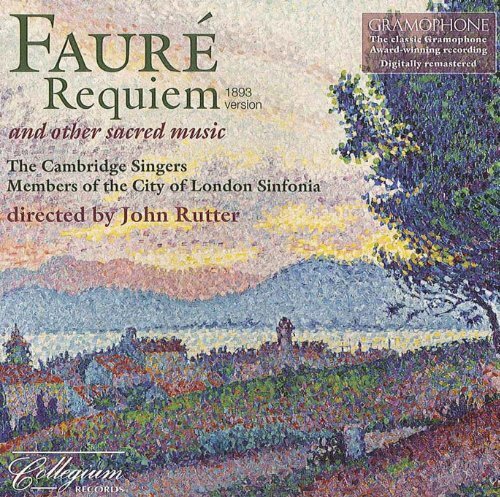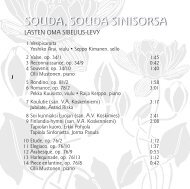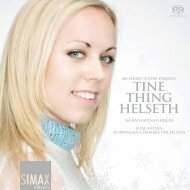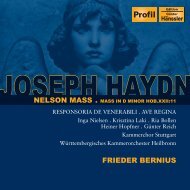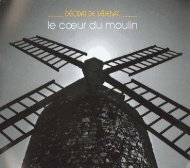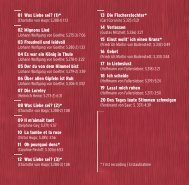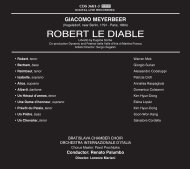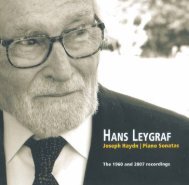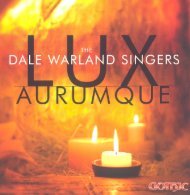You also want an ePaper? Increase the reach of your titles
YUMPU automatically turns print PDFs into web optimized ePapers that Google loves.
Carol ine Ask Lton (so<br />
Steph .en Varc :oe (bar<br />
Sirno1 I' Standage (solo violin)<br />
The C :ambridge Singers<br />
. -r<br />
nnpm~ers of the Citv of London smtoni;<br />
icted b:<br />
. ,\<br />
Total playing time 63' 17''<br />
Requiem<br />
1893 version edited by John Rutter<br />
Total 34' 34"<br />
IntroYt et I(yrie<br />
Offertoire<br />
Sanctus<br />
Pie Jesu<br />
Agnus Dei<br />
Libera me<br />
In paradisum
Ave verum Corpus, Op. 65, No. l(1894) (3' 37")<br />
for sopranos, altos and organ<br />
Tantum ergo, Op. 65, No. 2 (1894) (2' 28")<br />
for sopranos, altos and organ<br />
Soloists: Ruth Holton, Nicola-Jane Kemp, Melanie Marshall<br />
Ave Maria, Op. 67, No. 2 (1894) (1' 55")<br />
for solo voice and organ (performed by sopranos and altos)<br />
Maria, Mater gratiae, Op. 47, No. 2 (1888) (2' 49")<br />
for sopranos, altos and organ<br />
<strong>Cantique</strong> <strong>de</strong> <strong>Jean</strong> <strong>Racine</strong>, Op. 11 (1865) (6' 40")<br />
for mixed choir and organ or piano<br />
(Accompaniment transcribed for violas, cellos, basses and harp by John Rutter)<br />
Messe Basse (1881-1906)<br />
for sopranos, altos and organ<br />
Soprano solo: Ruth Holton<br />
I(yrie eleison<br />
Sanctus<br />
I@ Benedictus<br />
Agnus Dei<br />
(Total 10' 15")<br />
The Faurk Requiem, edited by John Rutter, as performed on this recording, is published in<br />
the USA by Hinsha~v Music, Inc. (P.O. Box 470, Chapel Hill, North Carolina 27514).<br />
Elsewhere in the world it is published by Oxford University Press (Great Clarendon Street,<br />
OX2 6DP, England). A Wer discussion of the sources and editorial method is<br />
contained in the preface to this edition.
"Hearing Faurt's Ryrriem as he inten<strong>de</strong>d it instrumentation is restrained and mellowv:<br />
to be performed would be a revelation to divi<strong>de</strong>dviolas and cellos, basses, harp, timpani<br />
most people." - Robert Orledge, Gabriel and organ, with a solo violin in the Snnctlts.<br />
Fn'nnr;, p. 110<br />
The strings - probably no more than a<br />
handfid at the first performance - mostly<br />
double the organ, which plays throughout<br />
It is one of musical history's mischances that like a Baroque continuo.<br />
the Faurt Reqrriem was for almost a century Faurt then prepared an expan<strong>de</strong>d version,<br />
known and performed only in a version with first given in January 1893. This inclu<strong>de</strong>d two<br />
fidl orchestra for which Faurt was very possi- extra movements, the Offertoire (written in<br />
bly not responsible; the composer's original 1889) and the Libera me, both calling for<br />
version of the work wvith instrumental ensem- baritone solo; the Libevn me, dating from<br />
ble remained unpublished and, until this 1877, was originally an in<strong>de</strong>pen<strong>de</strong>nt<br />
recording, wvas unperformed since his lifetime. composition for baritone and organ. The<br />
Behind this neglect lies a fascinating story. instrumentation wvas also expan<strong>de</strong>d for the<br />
Faurk began work on the Reqzrierrt in 1887 1893 performance: Faurk ad<strong>de</strong>d horn and<br />
purely, in his own words, 'for the pleasure of trumpet parts to his earlier manuscript, and<br />
it', though the <strong>de</strong>ath of his father in 1885 and violins were incorporated in the In Pnradimm.<br />
of his mother avo years later may well have The trumpet parts are fragmentary and<br />
lent impetus to the composition. He wvas 42 unimportant, but the horns have an essential<br />
years of age, choirmaster at the fashionable role in the Libern me and a useful one<br />
church of the Ma<strong>de</strong>leine in Paris, and gaining elsewhere; their fanfare-like figure in the<br />
a growing reputation as a composer. He com- Snnctus is hard to imagine left out, in fact.<br />
pleted the work early in 1888 and directed The third version of the Reqrriern - the<br />
the premiere on 16th January of that year; the familiar one wvith fdl orchestra - received its<br />
occasion wvas a funeral service at the premiere in July 1900 at the Trocadkro<br />
Ma<strong>de</strong>leine. This 'first version' (of which the Palace un<strong>de</strong>r the conductor Taffanel;<br />
manuscript of all but the Pie Jesrr survives) shortly afterwards Hamelle published vocal<br />
consisted of five movements: the Introit et and orchestral scores. How and wvhy this<br />
ICyrie, Snnctry Pie Jest4 Agnrrs Dei and In third version came about is not clear. In<br />
Paradisilm - a personal selection of texts lay- 1898 Faurt wrote to Hamelle promising to<br />
ing emphasis on rest and peace wvith no prepare the Requiem for publication but<br />
reference to the Day of Judgement. The asking ifhe could <strong>de</strong>legate the piano reduction<br />
W
for the vocal score to someone else (his horn parts also seem to represent genuine secstu<strong>de</strong>nt<br />
Roger-Ducasse~vas entrustedwvith the ond thoughts on Faurk's part. At the same<br />
task). No question of reorchestration was time the 1893 Requiern remains a liturgical<br />
mentioned at this stage; possibly Hamelle later work for mo<strong>de</strong>st forces to perform in<br />
urged Faur6 to rescore the work for 11l church, which is how the composer conorchestra<br />
because it would receive more ceived it. Performing it in this form for the<br />
performances as a concert work than as a first time in over 80 years was as exciting for<br />
liturgical Requiem. Faur6 was at the time me as seeing an old master painting stripped<br />
bur<strong>de</strong>ned with teaching and administrative of cloudy varnish and shining forth in all its<br />
work and may or may not have <strong>de</strong>legated the pristine clarity and splendour.<br />
rescoring to Roger-Ducasse, who is known to<br />
have scored more than one of Fauro's works. - k * S r * * . k<br />
At all events the published score of 1900<br />
(for which the source manuscript is lost) is Like the Requiern, the Messe Bnsse for<br />
extraordinarily inaccurate and fd of misprints, sopranos and altos had a complex genesis. It<br />
which suggests that the meticulous Faur6 was originally written in 1881 in collaboration<br />
never saw printer's proofi, at least. There are, w i t h Faurc's composer-fiend Messager for a<br />
moreover, many curious infelicities in the benefit performance at the fishing village of<br />
scoring - for example arbitrary recasting of ViUerville here the two men were on holiday:<br />
the 1893 horn parts, downwd transposition Messager wrote the I(r.ie and an 0 salrttnris,<br />
of the ethereal high violin solo in the Snvrctrrs, Faurk wrote the Glorin, Snnctrrs and &nus<br />
alterations of string bowing and distortion of Dei. The following year it wvas orchestrated,<br />
the original dynamic markings -which seem again in collaboration; then in 1906 Faurk disto<br />
betray an inexperienced hand. Above all, car<strong>de</strong>d Messager's ICyrie, substituting one of<br />
the nature of the RepGent music itself seems his own, at the same time discarding his own<br />
to call for the intimacy and clarity of a Glorin but adding a Benerlicttrs based on the<br />
chamber ensemble rather than 11l symphonic Q~ti tollis section of it. He also recast for<br />
forces which would swamp a choir such as the organ the original accompaniment of harmo<strong>de</strong>st-sized<br />
group of boys and men at the monium and violin. In this final form the<br />
Ma<strong>de</strong>leine for whom the work was written. Messe Bnsse was published in 1907.<br />
The i<strong>de</strong>al Reqrriern version seems to me to<br />
be that of 1893. The two extra movements in Faurt wrote over a dozen other sacred choral<br />
it are surely worth including, and the ad<strong>de</strong>d pieces which span the first forty years of his
career. The earliest published one was the<br />
Cnntiqtre <strong>de</strong> Jenrz Rncine, written in 1865<br />
for a competition at the Ecole Nie<strong>de</strong>rmeyer<br />
where the 20-year-old Faurt was a stu<strong>de</strong>nt;<br />
it won first prize. The later pieces - almost<br />
all of them Latin motets - were, like the<br />
Messe Basse, essentially simple and practical,<br />
well-suited to liturgical use. This simplicity<br />
is, however, <strong>de</strong>ceptive: both the Messe Bnsse<br />
and such expertly-wrought miniatures as the<br />
four motets here recor<strong>de</strong>d bear Faurt's<br />
unmistakable stamp-in their gentle<br />
expressiveness unblemished by the cloying<br />
sentimentality of so much nineteenthcentury<br />
church music, in their harmonic<br />
subtlety, and in their skilful avoidance of the<br />
predictably obvious. Above all, Faurt's<br />
instinct for vocal writing ensures melodies<br />
that are as grateful for the singer as they are<br />
heart-easing for the listener. The popularity<br />
of the Reqiriem and the relative obscurity of<br />
Faure's other choral music has ten<strong>de</strong>d to<br />
encourage a view that the Reqirienz was an<br />
isolated miracle in the composer's choral<br />
output; but the fact that so many of FaurC's<br />
fingerprints are also apparent in the Messe<br />
Bnsse and the motets not only sheds valuable<br />
light on the Reqiriern but gives them their<br />
own intrinsic interest and appeal. If it<br />
remains true that the Requiem is the<br />
mountain peak of Faurt's choral<br />
achievement, nevertheless the foothills offer<br />
both beauty and refreshment.<br />
JOHN R UTTER<br />
The Cambridge Singers<br />
Tmcks 1-7 ntzd 12:<br />
Sopranos: Caroline Ashton, Ruth Holton, Celia Jackson, Marcelle Mace, Sione Mace,<br />
Jo Maggs, Jocelyn Miles, Nancy-Jane Rucker, Mary Seers, Clare Wallace<br />
Altos: Alex Donaldson, Diana Hawker, Mary Hitch, Melanie Marshall, Mary Mure, Sara Tunnidifi<br />
Tenors: Harvey Brough, David Dunnett, Mark Padmore, Philip Sheffield, Jeremy Taylor,<br />
Roland Vernon, David Watson<br />
Basses: Gerald Finley, Charles Gibbs, Nicholas Jones, James Mure, Rory Phillips, Charles Pott,<br />
Christopher Purves, Russell Watson<br />
Trnch 8-1 1 and 13-1 6:<br />
Sopranos: Caroline Ashton, Ruth Holton, Karen Kerslake, Simone Mace, Jocelyn Miles,<br />
Mary Mure, Mary Seers, Alison Smart, Clare Wallace, Susanna Watson<br />
Altos: Nicola Barber, Peter Gritton, Mary Hitch, Nicola-Jane Kemp, Melanie Marshall,<br />
Susanna Spicer
Requiem<br />
IntroYt et Kyrie<br />
Requiem aeternam dona eis Domine: et lux perpetua luceat eis.<br />
Te <strong>de</strong>cet hymnus, Deus in Sion: et tibi red<strong>de</strong>tur votum in Jerusalem.<br />
Exaudi orationem meam, ad te omnis car0 veniet.<br />
Kyrie eleison. Christe eleison. Kyrie eleison.<br />
(Rest eter~zal~rant therrr, Lord orrr God, me pray to thee: and light perpetiral forever shine on them.<br />
Thort, 0 God, art worshipped in holy Sion: tinto thee the vow shall be perfornled in Jertsnlern.<br />
Hear tts, Lord; Lurd) hear thy serva,nlzts'prnyer: Lord, tr~zto thee allflesh shall come.<br />
ICyrie eleisorr. Cbriste eleisorz. I(yrie eleison.)<br />
Offertoire<br />
0 Domine Jesu Christe, Rex gloriae, libera animas <strong>de</strong>fimctorum <strong>de</strong> poenis inferni, et <strong>de</strong><br />
profimdo lacu:<br />
0 Domine Jesu Christe, Rex gloriae, libera animas <strong>de</strong>hctorum <strong>de</strong> ore leonis, ne absorbeat<br />
tartarus:<br />
0 Domine Jesu Christe, Rex gloriae, ne cadant in obscurum.<br />
Hostias et preces tibi Domine laudis offerimus: tu suscipe pro animabus illis, quarum hodie<br />
memoriam ficimus.<br />
Fac eas, Domine, <strong>de</strong> morte transire ad vitam. Quam olim Abrahae promisisti et semini eius.<br />
0 Domine Jesu Christe, Rex gloriae, libera animas <strong>de</strong>fimctorum <strong>de</strong> poenis inferni, et <strong>de</strong><br />
profimdo lacu: ne cadant in obscurum. Amen.<br />
(Lord Jestcs Cbrist, tho14 thnt rtrlest irz majesty, Ofree the sottls of thy fnithfirl rlepartedfronz<br />
torment eternal, nndfrot~z the fntho~nless tvnters: h d Jesfrs Christ, thou that rrtlest in nmjeesty,<br />
Ofree the sotrls of thy faithfill <strong>de</strong>pnrtedfionz olrt of the lion's jaw, lest they dro~va in the <strong>de</strong>pths of<br />
hell: Lord Jesra Christ, tho~c thnt milest itz majesty, 0 save then8 from trtter darktress. Hear orrr<br />
prayer arzd let our cry come uwto thee; God orir Father, boom thilze enr: :.we pray this day for all the<br />
souls <strong>de</strong>parted; 0 renrenzber them, Lord, tve pray. Gant them) Lord, <strong>de</strong>livera~zce fiowz <strong>de</strong>ath tinto<br />
life, we pray thee) as of old thou hast promised to olrr fathers, Ahham and his seed. Lord Jenbs<br />
Chvist) thou thnt rulest iz ~najesty, free the sortls of thy fnithfirl <strong>de</strong>pavtedfiom tornzent eternal,<br />
and from the fathornless waters. Save them, 0 Lord,frorn the dnrhness of hell. Amen.)
Sanctus<br />
Sanctus, Sanctus, Sanctus, Dominus Deus Sabaoth.<br />
Pleni sunt coeli et terra gloria tua. Hosanna in excelsis. Sanctus.<br />
(Holy, Holy, Holy, Lord God of hosts. Heaven and earth areJirll of thy~lor~ 0 Lord. Hosnntta<br />
in the h&hest. Holy.)<br />
Pie Jesu<br />
Pie Jesu Domine, dona eis requiem.<br />
Pie Jesu Domine, dona eis sempiternam requiem.<br />
(Blessed Jesft, Lord, Iprny, in thy mercyflrnnt them rest. 0 blessed Jeszt, Lord, Iprny, in thy<br />
nzercypttt them everlasti~ rest.)<br />
Agnus Dei<br />
Agnus Dei, qui tollis peccata mundi, dona eis requiem.<br />
Agnus Dei, qui tollis peccata mundi, dona eis sempiternam requiem.<br />
Lux aeterna luceat eis, Domine: Cum sanctis tuis in aeternum, quia pius es.<br />
Requiem aeternam dona eis Domine: et lux perpetua luceat eis.<br />
(Lamb of God, who takest away the sins of the world: O~rant them rest for evermore. Hear trs,<br />
hear zis, 0 Lnr11b of God: we pray thee, Saviour of all the world, Opnt<br />
thetrt eternal rest.<br />
Lamb of God, who takest anwy orrr sins, O~rant them eternal rest; peace be with thein<br />
evermore. Lt3htperpetnal shine rtpon them, Lord, me pray: with all thy saints in ertdless~lory,<br />
for thy ten<strong>de</strong>r ~nercy'sake. Rest eternalflrant thew, Lord ortr God, ae prny to thee: and l&ht<br />
perpetrral forever shine on them.)<br />
Libera me<br />
Libera me, Domine, <strong>de</strong> morte aetema, in die illa tremenda:<br />
Quando coeli movendi sunt et terra: dum veneris judicare saeculum per ignem.<br />
Tremens factus sum ego, et timeo, durn discussio venerit, atque ventura ira.<br />
Dies illa, dies irae, calamitatis et miseriae, dies magna et amara val<strong>de</strong>.<br />
Requiem aeternam dona eis Domine, et lux perpetua luceat eis.
(Lord, Ipray, <strong>de</strong>liver me flom <strong>de</strong>ath3 everlasti~gfire ow thntjreat Day of J~rrlg-enent, on that<br />
lnst dreadfifirl day: When the earth and the henv'rts shall shake and tremble, aaltd thou shalt<br />
come with thy nt~hty flnminjfire of judjement. Treinblilg) trernblirg I stand before thee in<br />
fear and dread: thy wrath shall <strong>de</strong>scetad on the earth and britg all flesh to <strong>de</strong>solation. Day of<br />
trinl, day of judae~ment, <strong>de</strong>ath and <strong>de</strong>struction, torment nrzd distress: day of atger, rlny of<br />
venjeance, hy of mortrninj, of woe and bitterjrief: Rest eternaljrnrtt thein. Lord our God)<br />
we pray to thee, and 1z)ht perpetual shim ever on tbem.)<br />
In paradisum<br />
In paradisum <strong>de</strong>ducant angeli: in tuo adventu suscipiant te martyres, et perducant te in<br />
civitatem sanctam Jerusalem. Chorus angelorum te suscipiat, et cum Lazaro quondam<br />
paupere aeternam habeas requiem.<br />
(God3 holy anjels lead you to paradise: may saints in theirjlory receive you at your joxrney's<br />
etad) jttiditg yortr footsteps into the Holy City Jerusalem. Choirs of a~gelsin8 you to your rest:<br />
a~zd with Lnzarics raised to eternal life, may you for evermore rest in peace.)<br />
(Trntrslntion by John Rutter O 1984 Hinsbnm Music, Inc.)<br />
Ave verum Corpus<br />
Ave verum Corpus, natum<br />
De Maria Virgine,<br />
Vere passum, immolatum<br />
In cruce pro homine.<br />
Cuius latus perforatum<br />
Unda fluxit sanguine;<br />
Esto nobis praegustatum,<br />
Mortis in examine.<br />
0 Jesu, Jesu dulcis,<br />
0 Jesu, Jesu pie,<br />
0 Jesu, fili Mariae,<br />
Tu nobis miserere. Amen<br />
(Seyttence hymn for thew of Corprrs Christi)<br />
(Hail, true body of Christ<br />
Born of the Virjin Mary,<br />
Who truly st@fered, sncrzficed<br />
Or& the cross for mn~lrind.<br />
From whose pierced si<strong>de</strong><br />
Flowed water and blood;<br />
Be our consolation<br />
In <strong>de</strong>ath's orrlenl.<br />
0 Jesu, sweet Jesu)<br />
0 Jesu, holy Jesu,<br />
0 Jesit, sort of Mary)<br />
Have mercy rbpon us. Amen.)
Tantum ergo<br />
Tantum ergo Sacramentum<br />
Veneremur cernui,<br />
Et antiquum documentum<br />
Novo cedat ritui.<br />
Genitori, Genitoque<br />
Laus et jubilatio,<br />
Salus, honor, virtus quoque<br />
Sit et benedictio;<br />
Proce<strong>de</strong>nti ab utroque<br />
Compar sit laudatio. Amen.<br />
(St Thornas Aqzrinas, 1227-74)<br />
Ave Maria<br />
Ave Maria, gratia plena, Dominus tecum;<br />
benedicta tu in mulieribus, et benedictus fructus ventris tui Jesus.<br />
Sancta Maria Mater Dei, ora pro nobis peccatoribus,<br />
nunc et in hora mortis nostrae. Amen.<br />
(Therejke we, before him bend in^,<br />
This~reat Sacrameat revere;<br />
Types and shadolvs have their ewdin~,<br />
For the nnver rite is here.<br />
Glory let rrs~ive, nnd blessitg<br />
To the Father and the Son;<br />
Hononl; a@ht and praise nddressin~<br />
While eternal aaes rttn;<br />
Ever too his love coiafessing<br />
Who flona both, vith both is owe. Amen.)<br />
(Hail Mary,firll of~race, the Lord is with thee; Blessed art thorr amoig wornen, and blessed is<br />
the flftit of thy womb, Jesus. Holy Mary, riaother of God, pray for rdssinners, now and at the<br />
horir of our <strong>de</strong>nth. Awten.)<br />
iij Maria, Mater gratiae<br />
Maria, Mater gratiae,<br />
Dulcis Parens clementiae,<br />
Tu nos ab hoste protege,<br />
Et mortis hora suscipe.<br />
Jesu, tibi sit gloria,<br />
Qui natus es <strong>de</strong> Virgine,<br />
Cum Patre et almo Spiritu,<br />
In sempiterna saecula. Amen.<br />
(Cantas diversi in honorein B. M. IT)<br />
(Mwy~rncio~u mothev,<br />
Sweet fonrzt of mercy,<br />
Protect zrs fiana the foe<br />
and receive fu in our hozw of <strong>de</strong>ath.<br />
Jesw, born of the Virgin,~lory be to thee<br />
with the Father and the Holy Spirit<br />
For ever and evev. Amen.)
a <strong>Cantique</strong> <strong>de</strong> <strong>Jean</strong> <strong>Racine</strong><br />
Verbe tgal au Ti-6.-Haut, notre unique esptrance,<br />
lour tternel <strong>de</strong> la terre et <strong>de</strong>s cieux,<br />
(Worrl of God, one with the Most H&hJ in 116m<br />
alone ~ve have oitr /lope,<br />
De la paisible nuit nous rompons le silence: Everhsti~g light of heaven and earth,<br />
Divin Sauveur, jette sur nous les yeux!<br />
We brenk the silence of the pencej~l n&ht;<br />
R6pand.s sur nous le feu <strong>de</strong> ta g&ce puissante;<br />
Snvioftr divine, cnst thbe eyes npon ~u!<br />
Que tout I'enfer lie au son <strong>de</strong> ta voix; Poftr on iw theJive of thy mightyarace,<br />
Dissipe le sommeil d'une h e languissante, Tlhnt all hell rnnyfTee nt the sorrnd of thy voice:<br />
Qui la conduit 1 l'oubli <strong>de</strong> tes lois!<br />
Bnwish the slftrnber ofn weary sozrl,<br />
0 Christ, sois favorable i ce peuple fidle<br />
That brirgs frn~etfi~beu of thy laws!<br />
Pour te btnir maintenant rassemblt; 0 Chrirt, look with fnvor~r rcpm1 thy faithfrrlpeoph<br />
Reqois les chants qu'i ofie 1 ta gloire immortelle; Now~athered here topnise thee;<br />
Et <strong>de</strong> tes dons qu'il retourne comblt!<br />
Receive their hymns offered to thy enrllessalor~<br />
(from Hpntres madftites dt4 brkiaire romnin) Mny they~ofivthfilled with thyjtfi.)<br />
Messe Basse<br />
1. Kyrie eleison<br />
IZyrie eleison. Christe eleison. Kyrie eleison. (Lord have mercy. Christ hnve mercy. Lord<br />
have vrtercy.)<br />
2. Sanctus<br />
Sanctus, Sanctus, Sanctus, Dominus Deus Sabaoth. (Holy, Holy, Holy, Lord God of hosts. Heaven<br />
Pleni sunt caeli et terra gloria tua.<br />
Hosanna in excelsis.<br />
and earth nre full of thyglory. Hosnnnn in<br />
the hhhest.)<br />
3. Benedictus<br />
Benedictus qui venit in nomine Domini. (Blessed is he who cortzeth in the nnme ofthe M)<br />
4. Agnus Dei<br />
Agnus Dei, qui tollis peccam mu&, miserere nobis. (Lamb ofGod, that tnkest nway the sins ofthe<br />
Agnus Dei, qui tollis peccata mu&, miserere nobis. world, have mercy ftpott rw. (Repent)Lanzb of<br />
Agnus Dei, qui tollis peccaa dona nobis God, that takest away the sins ofthe world, h n t<br />
its pence.)
instrumental ensemble, other items by sopranos, altos and organ.


